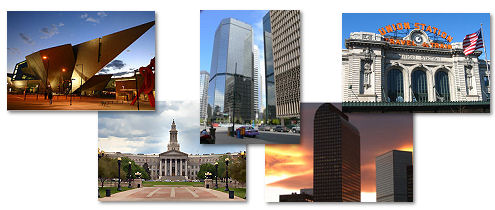
City Maps/Weather
| Fun City Facts The Mall of America in Bloomington, Minnesota is over 9.5 million square feet, or the size of 78 football fields. The largest city in area in the United States is Juneau, Alaska. It covers 3,248 square miles, yet the city population is fewer than 30,000. |
|
|
||||||||
Denver, Colorado
City History |
||||||||
 Denver was founded during the Pikes Peak Gold Rush in the Kansas Territory in 1858. That summer, a group of gold prospectors from Lawrence, Kansas arrived and established Montana City on the banks of the South Platte River. This was the first settlement in what was later to become the city of Denver. The site faded quickly, however, and was abandoned in favor of Auraria and St. Charles City by the summer of 1859. On November 22, 1858, General William Larimer, a land speculator from eastern Kansas, placed cottonwood logs to stake a claim on the hill overlooking the confluence of the South Platte River and across the creek from the existing mining settlement of Auraria. Larimer named the town site Denver City to curry favor with Kansas Territorial Governor James W. Denver. Larimer hoped that the town's name would help make it the county seat of Arapaho County, but ironically Governor Denver had already resigned from office. The location was accessible to existing trails and was across the South Platte River from the site of seasonal encampments of the Cheyenne and Arapaho. Larimer, along with associates in the St. Charles City Land Company, sold parcels in the town to merchants and miners, with the intention of creating a major city that would cater to new emigrants. Denver City was a frontier town, with an economy based on servicing local miners with gambling, saloons, livestock and goods trading. In the early years, land parcels were often traded for grubstakes or gambled away by miners in Auraria. The Colorado Territory was created on February 28, 1861, Arapahoe County was formed on November 1, 1861 and Denver City was incorporated on November 7, 1861. Denver City served as the Arapahoe County Seat from 1861 until consolidation in 1902 and then in 1865, Denver City became the Territorial Capital. With its new-found importance, Denver City shortened its name to just Denver. On August 1, 1876, Denver became the State Capital when Colorado was admitted to the Union. Between 1880-1895 the city experienced a huge rise in city corruption, as crime bosses, such as Soapy Smith, worked side-by-side with elected officials and the police to control the elections, gambling, and the bunko gangs. In 1887, the precursor to the international charity United Way was formed in Denver by local religious leaders who raised funds and coordinated various charities to help Denver's poor. Denver hosted the 1908 Democratic National Convention to promote the city's status on the national political and socio-economic stage. Denver was also later selected to host the 1976 Winter Olympics to coincide with Colorado's centennial celebration, but Colorado voters struck down ballot initiatives allocating public funds to pay for the high costs of the games, so the games were moved to Innsbruck, Austria. The notoriety of becoming the only city ever to decline to host an Olympiad after being selected has made future bids difficult. Denver has also been known historically as the Queen City of the Plains because of its important role in the agricultural industry of the plains regions along the foothills of the Colorado Front Range. Several US Navy ships have been named USS Denver in honor of the city. |
Historic Figures
William Larimer Jr. (1809-1875)| William Larimer Jr. (1809-1875) | |
| An American politician, soldier, and lawyer. He served in the California state government, as an officer in the United States Army in two wars, and as a Democratic member of the United States House of Representatives from California. He served as secretary and Governor of the Kansas Territory during the struggle over whether or not Kansas would be open to slavery. The city of Denver, Colorado, is named after him. | |
browse cities | search | get listed | spotlight | about us | contact us | policies | partners
Copyright ©2024 www.ByCityLight.com - Page Design by Erik Schubach and Tristan Chambers